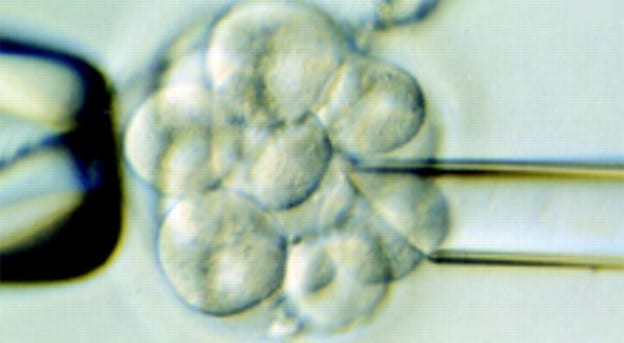
Definition and first applications
Preimplantation genetic diagnosis is a technique used to identify genetic defects in embryos created by in vitro fertilisation (IVF) prior to pregnancy. Preimplantation genetic diagnosis (PGD) refers specifically to when one or both genetic parents have a known genetic abnormality and the test is performed on an embryo to determine whether the embryo also has a genetic abnormality. In contrast, preimplantation genetic screening (PGS) refers to techniques where embryos from presumed genetically normal parents are screened for aneuploidy.
Since only unaffected embryos are transferred to the uterus for implantation, pre-implantation genetic testing offers a alternative to current post-conception diagnostic procedures (amniocentesis or chorionic villus sampling), which are often followed by the difficult decision to terminate the pregnancy if the results are unfavourable. PGD and PGS are currently the only options available to avoid a high risk of having a child affected with a genetic disease before implantation. It is a good means of preventing inherited genetic diseasesthus eliminating the dilemma of termination of pregnancy after an unfavourable prenatal diagnosis.
Preimplantation genetic diagnosis was developed in the UK in the mid-1980s. as an alternative to prenatal diagnosis. Initially, PGD revolved around gender determination as an indirect means of avoiding an X-linked disorder. In 1989 in London, Handyside and colleagues reported the first child born after PGD for an X-linked disorder.
Candidates for pre-implantation genetic diagnosis
Pre-implantation genetic diagnosis is recommended when couples are at risk of transmitting a known genetic abnormality to their child. Only healthy and normal embryos are transferred into the mother's uterus, thereby decreasing the risk of inheriting a genetic abnormality and late termination of pregnancy (after positive prenatal diagnosis).
Prime candidates for pre-implantation genetic diagnosis are:
- Couples with a family history (background) of X-linked disorders (couples with a family history of X-linked disease have a 25% risk of having an affected embryo - "half of all male embryos").
- Couples with chromosomal translocationswhich can cause implantation failure, recurrent miscarriages, or physical or mental problems in the offspring.
- The bearers of autosomal recessive diseases. For carriers of autosomal recessive diseases the risk of an embryo being affected is 25 percent.
- The bearers of autosomal dominant diseases. In this case the risk of an embryo being affected is 50 percent.

